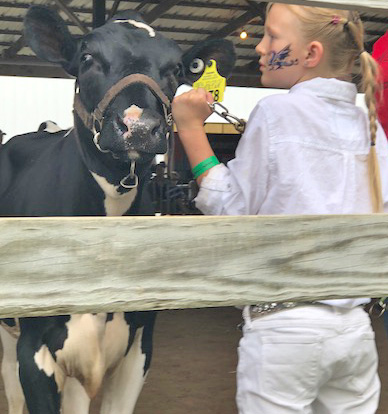Why are fairs so important to 4-H?
Fairs can be an intricate part of 4-H.

Why are fairs so important to 4-H?
County fairs are the most recognizable element of the local 4-H program. According to Michigan State University Extension, fair is a culmination of many weeks, months or even a year’s worth of learning, creating and discovering through 4-H experiences. For years there have been many different opinions about the purpose of county fairs in regard to the 4-H program.
It may not be the fair itself that is so important to the program, but the entire package. When a youth raises an animal, for example, whether it is for market or for show, they have to care for, work with and learn about that animal. The opportunity to show it at the fair is the driving force that motivates them to get up early, go out and work with their animal, to watch a DVD on how to show the animal, to go to club meetings and so forth. The youth may take good care of their animal because they are a caring person, but most people wouldn’t deny that the youth put in that extra effort knowing they are going to show it at the fair.
This can also be true for non-animal projects. Youth may love to take pictures, but the idea of bringing those photos to the fair to be judged may encourage them to learn more. Through lessons with a project leader or a conversation with a photography judge, youth may learn how to use proper light, crop a photo, find the focal point within the photo and much more.
Now the question is, are these things important to youth development? Is it important we teach youth how to raise an animal and show it? Is it important to teach them how to take good photographs if that isn’t going to be their career? While these are nice bonuses to our program, most staff would argue they are not the goal of the program. They are, however, hooks we use to get to the real purpose of teaching life skills.
 Through 4-H projects, youth may learn leadership as they take on roles within their club such as club officer or chair of a committee. They may learn empathy or understanding as they learn about others’ challenges or about youth from another part of the community. Youth learn teamwork and character building as they work together with their club toward common goals.
Through 4-H projects, youth may learn leadership as they take on roles within their club such as club officer or chair of a committee. They may learn empathy or understanding as they learn about others’ challenges or about youth from another part of the community. Youth learn teamwork and character building as they work together with their club toward common goals.
Youth who raise animals may learn self-discipline and responsibility as they take care of a living thing that depends on them every day for their welfare. During the judging process, a youth may have to explain their project to a judge, which helps to develop their social and interview skills. During times of disappointment or excitement, they will learn things such as good sportsmanship, managing their feelings or being concerned for others.
Many times the youth don’t even realize all the great things they have learned until they reflect back on their experience in 4-H when they are older. Many will admit that their 4-H experiences helped them to develop their leadership skills and become more well-rounded citizens that are able to see the bigger picture.
Certainly everything one does in life teaches life skills, which in turn help people to develop and mature as citizens within a community. Through 4-H, however, volunteers and staff can help youth to develop more of these skills earlier in life, assist them to be successful, to be able to face challenges head-on and to persevere.
So the next time you have the opportunity to visit a county fair, take it and be sure to look at all the 4-H projects. When you see the innovative, creative and outright impressive projects, think of how much more they actually mean and the path the youth has traveled to get the project finished.



 Print
Print Email
Email




